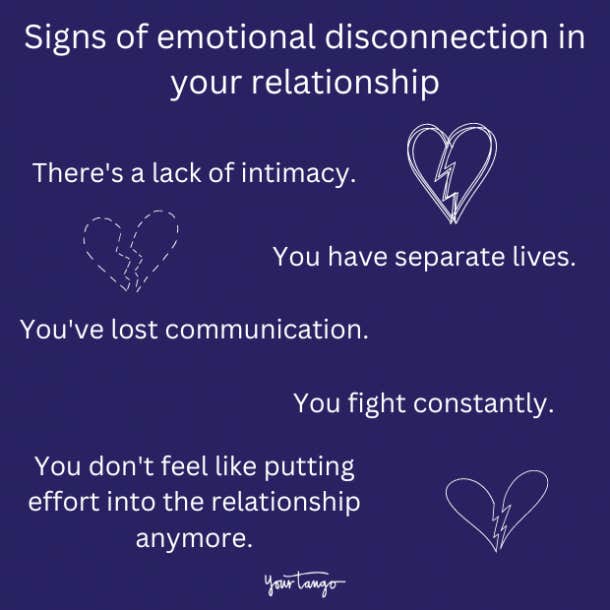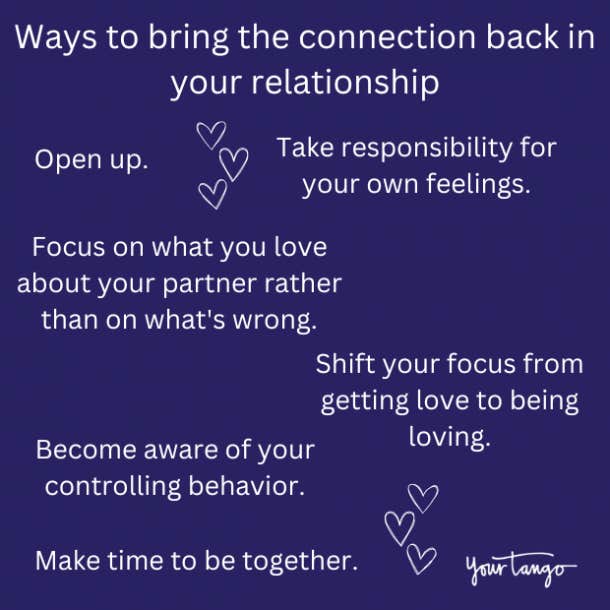Yet many couples who felt very connected with each other at the beginning of the relationship find themselves drifting apart, losing the in-love feelings that brought them together in the first place.
What is emotional disconnection?
Emotional disconnection, also known as emotional detachment, is a psychological condition where a person cannot fully express or engage with their feelings or the feelings of those around them. In other words, it’s when a person doesn’t allow themselves to connect with other people on an emotional level. RELATED: How To Fall Back In Love With Your Partner (Because Yes, You Can)
5 Signs of emotional disconnection in a relationship
1. There’s a lack of intimacy.
A lack of intimacy doesn’t just suggest that your sex life is on hold. It signals that your emotional connection with one another is missing. It means you’re not kissing, holding hands, or touching each other playfully, and you aren’t interacting affectionately. This shows a need for rebuilding that genuine desire to be affectionate toward one another that started your romance so you can reconnect intimately in other areas of your life. This will give you a boost in finding ways to bridge other areas where perhaps you may not be seeing eye-to-eye or you find yourselves bickering over the same, small thing when, in fact, it has nothing to do with those things, but the lack of intimacy you’ve been experiencing in your relationship.
2. You have separate lives.
When your lives go in different directions, this is a big red flag that the two of you have lost a fundamental connection in your relationship. Perhaps you’ve drifted apart, have new interests, or work has taken a larger role in one or both of your lives. It could mean you’re seeking different things out of life, or maybe one of you has met someone new. All of these should be a topic for discussion if both of you want to move forward in your relationship, though some, more obviously than others, may be more difficult to work out.
3. You’ve lost communication.
Amidst busy schedules with work, kids, and everything else that comes with the different phases of life that you are bound to go through in a relationship depending on where you are in your life, it’s easy to understand how some couples stop knowing how to communicate with each other. However, communication is yet another fundamental aspect of connection in a relationship that requires attention and maintenance. Left unattended, that lack of communication leads to the loss or inability to know how to keep the lines of communication open, making it harder to reconnect emotionally and physically. As busy as life can get, communication should never get de-prioritized in any relationship.
4. You fight constantly.
Fighting constantly can be a sign of many things, but it leads to a lack of connection between you and your partner. Perhaps you’re fighting over every little thing, over the same thing repeatedly, or over something you don’t know how to stop fighting about because it’s so large and difficult to navigate without outside help. The problem with this cycle of never-ending fighting is that it leads to a loss of connection over any positive things going on in either of your lives. Neither one of you can encourage or celebrate any of each other’s, your own, or your shared victories. You can’t find it in yourselves to enjoy the little things together. You’re unable to find an emotional connection that leads to the kind of intimacy a relationship needs to continue thriving. You owe it, not only to yourselves — but to each other, to find a way to make this happen.
5. You don’t feel like putting effort into the relationship anymore.
We’ve all heard it — relationships, and marriages especially, take effort and work. That work is an effort that must come from both sides. Of course, you and your partner will have days when you’re tired, you fight, you want to give up, and perhaps you say some heated things to each other in the moment that you don’t truly mean. However, at the end of the day (or week), you should not want to throw up your hands in despair and stop trying. Even if you do, there are paths you can take to come back to the drawing board and keep trying, because the reality is: no relationship is perfect — not even close. Any relationship takes effort. A lot of it. You may not see it now, but you’ve likely come a long way just to get where you are in your partnership now, and if that’s true, chances are, it’s not worth giving up on just yet.
RELATED: 10 Uncomfortable Signs You’re Falling Out Of Love With Your Forever Person If you’re feeling disconnected, you can fall back in love and revive the fun and passion in your relationship — but this doesn’t just happen by itself. There are specific things you need to do to heal your relationship when you’re feeling disconnected.
How to bring back the connection in a relationship
1. Open up.
One of the experiences that led to connecting in the first place was probably that you were open to one another at the beginning of your relationship. Most people are open when they first meet because they’re not invested in the relationship yet. But as you fall in love and your fears are activated — fear of rejection, fear of engulfment, or fear of losing yourself — you might start to close up and protect yourself. Ironically, closing up can create the very things you fear. In any given moment, your intent with your partner is either to be open to learning about yourself and your partner or to protect against what you fear with some form of controlling behavior. To heal the disconnection in your relationship, you need to consistently choose to be open to learning, especially in conflict. You cannot resolve conflict if one or both of you are closed, yet conflict is easily resolved when both of you are open to caring about your own and your partner’s highest good. Opening up means you’re willing to hear each other with caring and understanding for each other’s feelings and points of view, rather than arguing, defending, withdrawing, or giving yourself up.
2. Take responsibility for your own feelings.
When you close up and protect yourself from getting hurt, you cause yourself a lot of pain. Shutting down, getting angry, judging yourself, or giving yourself up hurts you. Instead of blaming your partner for your pain, be open to learning about how you are rejecting and abandoning yourself. That is what’s causing your pain. If your partner hurts you by shutting down, getting angry, blaming, or withdrawing, offer compassion for the loneliness and heartache that we all feel when someone we love disconnects from us. Instead of blaming your partner for hurting you, be very kind and caring with yourself, keeping your own heart open so that when your partner opens up again, you can reconnect. It’s very helpful, in taking loving care of your feelings, to develop a personal connection with a loving and comforting source of spiritual guidance. Being able to open to this source for love and compassion can help you keep your heart open to love. The more you’re able to learn to love yourself by taking compassionate care of your own feelings, the more love you will have to share with your partner.
RELATED: How To Make Someone Fall In Love With You Using Psychology
3. Focus on what you love about your partner rather than on what’s wrong.
When the bloom of falling in love starts to wear off, you might find yourself focusing on what you don’t like about your partner. We all have an ego-wounded self that often rears its controlling head when we feel insecure. None of us likes each other’s wounded self, but it’s not the wounded self we fell in love with. What we fell in love with is the soul essence of each other. This part of us is what’s truly beautiful and wonderful about each of us. If you focus on your partner’s wounded self, you will likely feel disconnected and resentful towards your partner, but if you focus on your partner’s essence, you can regain your original in-love feelings.
4. Make time to be together.
Once people live together, they get busy and often forget to make time for each other. Connection flourishes when you have the time to talk, learn, share, laugh, play, and make love. Try setting aside date times like you did when you were dating. We all live busy lives, especially after having children, but if a loving and connected relationship is important to you, you need to make time together a high priority. RELATED: 11 Subtle Signs Your Partner Has Lost Feelings (And Might End Things)
5. Become aware of your controlling behavior.
Most partners are aware of how the other person tries to control, but they’re often completely unaware of how they try to control. Here are some of the ways you might be controlling without realizing it:
Giving yourself up: To avoid conflict and rejection, do you give yourself up and go along with what your partner wants? When you’re giving yourself up, you’re trying to control how your partner feels about you.Withdrawing: Withdrawal is generally a form of punishment, which says, “I will withdraw my love from you until you behave the way I want you to behave.” You might use TV, work, the Internet, porn, video games and many other activities to shut your partner out.Getting angry and/or blaming: Anger and blame are ways to intimidate your partner into doing what you want him or her to do.Explaining, defending, teaching, nagging, or analyzing: These are all ways of trying to get your partner to give himself or herself up and see or do things your way.Turning to substance addictions: This is another way of shutting out your partner. It’s also a way of controlling/avoiding your feelings rather than learning how to take responsibility for them.
The problem with these controlling behaviors is that your partner will likely react by doing the same things or going into resistance. Each of you then perpetuates the disconnection between you. By becoming aware of your own controlling behaviors and being open to learning, you can heal your disconnection.
6. Shift your focus from getting love to being loving.
Did you enter your relationship to get love or to get your partner to give you the sense of worth and security you’re not giving to yourself? If you did, your partner probably has the same agenda since we’re attracted at our common level of woundedness — our common level of self-rejection. When you shift your focus away from getting love and toward giving love to yourself and sharing your love with your partner, everything changes! If both of you learn how to bring love to yourselves and then share your love, your emotional connection will heal. RELATED: 3 Fail-Proof Ways To Make Him Fall In Love With You — All Over Again Dr. Margaret Paul holds a Ph.D. in psychology and is the co-creator of the powerful Inner Bonding® self-healing process, and the related SelfQuest® self-healing online program. She is the author and co-author of several best-selling books.

